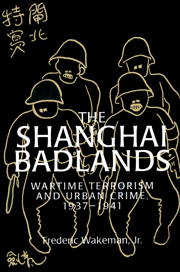Book contents
- Frontmatter
- Contents
- Dedication
- Acknowledgments
- Glossary
- Shanghai, 1940
- Metropolitan Shanghai
- Dedication
- Prologue: Consequences
- 1 Island Shanghai
- 2 Blue Shirts
- 3 National salvation
- 4 Retaliation: Pro-Japanese terrorism
- 5 Provocation: The Chen Lu assassination
- 6 Capitulation: The Xi Shitai assassination
- 7 The puppet police and 76 Jessfield Road
- 8 Terrorism and crime
- 9 Rackets
- 10 Terrorist wars
- 11 Dimout
- Epilogue: Outcomes
- Abbreviations
- Notes
- Bibliography
- Index
8 - Terrorism and crime
Published online by Cambridge University Press: 02 November 2009
- Frontmatter
- Contents
- Dedication
- Acknowledgments
- Glossary
- Shanghai, 1940
- Metropolitan Shanghai
- Dedication
- Prologue: Consequences
- 1 Island Shanghai
- 2 Blue Shirts
- 3 National salvation
- 4 Retaliation: Pro-Japanese terrorism
- 5 Provocation: The Chen Lu assassination
- 6 Capitulation: The Xi Shitai assassination
- 7 The puppet police and 76 Jessfield Road
- 8 Terrorism and crime
- 9 Rackets
- 10 Terrorist wars
- 11 Dimout
- Epilogue: Outcomes
- Abbreviations
- Notes
- Bibliography
- Index
Summary
The conclusion of the Chen Lu murder case and the breakup of the Wang Jingwei assassination conspiracy were also a triumph for 76 Jessfield Road. Credit for many of these arrests, including the capture of another group of secret agents sent from Chongqing to kill Wang Jingwei, was given by Japanese newspapers such as Tokyo nichinichi to Messrs. Ding Mocun and Li Shiqun of the Reform Government special services group. Li Shiqun was thus able to boast, when he visited Tokyo later in the fall, that he had destroyed or utterly undermined Nationalist military intelligence (Juntong) throughout Shanghai, Nanjing, Jiangsu, Zhejiang, and Anhui. “With the left hand we annihilate the Blue Shirts, with the right hand we knock down the C.C. clique.”
According to Shanghai Municipal Police reports, however, “76” was also responsible for a series of assassination attempts itself, including the brutal murder of Miss Mao Liying, chair of the Chinese Women's Vocational Joint Friendship Society (Zhongguo funü zhiye lianyi hui), on December 12, 1939, by a group of five men who fought off police with pistols before brazenly driving back to 76 Jessfield Road to report in.
G. Godfrey Phillips, the secretary of the Shanghai Municipal Council who had himself been fired on, felt obliged to turn to the consular authorities by writing a letter on April 29,1940, to Commander L. Neyrone, the Italian consul general who was dean of the Shanghai Diplomatic Corps. In the letter he expressed grave anxiety about the activities of the Special Services Corps of the China Guomindang Anti-Comintern and National Salvation Army headquarters at “76.”
- Type
- Chapter
- Information
- The Shanghai BadlandsWartime Terrorism and Urban Crime, 1937–1941, pp. 93 - 103Publisher: Cambridge University PressPrint publication year: 1996

